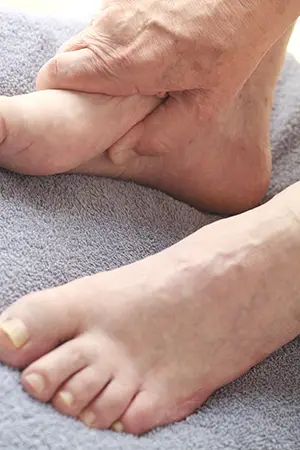 By Jarod Spencer, DPM, Heartland Foot and Ankle Associates
By Jarod Spencer, DPM, Heartland Foot and Ankle Associates
Gentlemen, we’ve all been there. We’ve woken up after a weekend of yardwork, a day on the slopes, or a game of pick-up basketball and find ourselves with more than a few small aches and pains. Whether it’s a sore back, a tight muscle, or a stabbing pain on the bottom of your heel, as men, we have quite the tendency to just “walk it off” or “let it blow over.” For some reason, it has typically been engrained in men’s personas to “be tough” and “shake it off,” even at the risk of sacrificing our health. What actually makes you weaker: a torn tendon or being treated by a healthcare professional?
Since we are in the prime of Super Bowl craze, we need to look no further than the NFL for an example of how irresponsible men can be in regards to their health, both current and future. Researchers are finding more and more evidence to correlate repetitive head trauma (regardless of the sport or activity) with poor long-term outcomes in mental health and, frankly, survival. Some professional athletes have taken this new research seriously and have found a way to get over their ego and walk away from the game for good, putting their future health high up on their priority list. Of course, this research has also led to new regulations for concussion identification and treatment and limiting amount of full contact, trickling down from professional to peewee levels. To me, what this really shines a light on is the importance of prioritizing your health, despite what you may have to give up.
Whether you live an active lifestyle or sit at a desk all day and watch TV at night, it is critical that you pay attention to what your body is trying to tell you. The problem with the typical male mentality of ignoring an ache or a pain or any abnormal physical or mental feeling is that small problems don’t always go away. Many times, they accumulate and build up. Aches and pains are the body’s way of warning us that something may be wrong, and it could be a new problem or an old, small problem that finally turned into a big one.
An example of the latter is what is called degeneration, where perhaps the tendons or ligaments helping create the arch in your foot eventually stretch too much and wear out over time, until finally your arch collapses. Another example of degeneration is the development of arthritis, perhaps in your big toe joint. This can occur after trauma, like a broken bone in the joint, or it can occur as a result of improper biomechanics as we walk, with “small” repetitive problems accumulating over time, until finally the joint surfaces start to wear out and you are left with a very painful big toe that makes walking difficult.
It is easy to make excuses and not get help, but many “aches and pains” can easily be treated by a medical professional, which may very well prevent bigger problems down the road. In this time of New Year’s resolutions, pay attention to your body’s warnings and prioritize your health by seeking medical attention, whether it is for treatment or prevention. Real men don’t “walk it off,” they get it checked out!
Dr. Jarod Spencer and Dr. Carly Kriedberg have joined Dr. Lockwood and the team at Heartland Foot and Ankle Associates. If you have any foot problems, contact them at 309-661-9975 or visit them online at www.HeartlandFootandAnkle.com. Their office is located at 10 Heartland Dr. in Bloomington.

